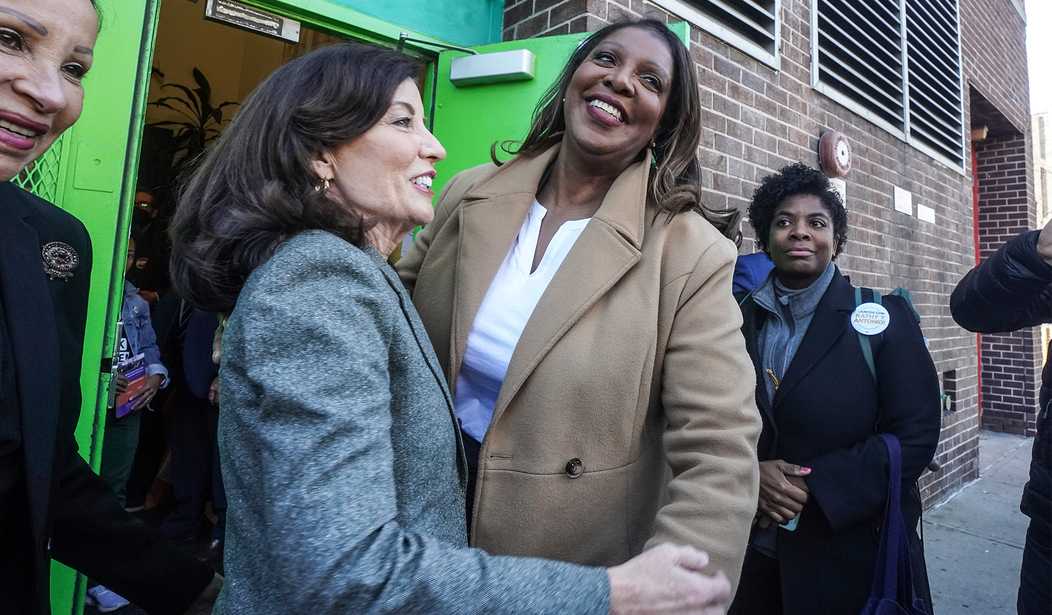Top News
Apparently, New York Wasn’t Releasing Criminals Quickly Enough

In New York State, the government rarely seems interested in locking people up unless their last name is Trump. But on the rare occasions when they do toss someone in the slammer, they’re always in a rush to release them as quickly as possible. That’s how we wound up with the state’s disastrous bail reform law that has driven crime rates skyward. But today, Governor Kathy Hochul is dumping some extra kerosene on the fire. She’s signing the “Clean Slate Act,” and if you’re familiar with how politicians name bills, you can already guess that this won’t be a good deal for law-abiding New Yorkers. Under this law, the majority of people committed of crimes will have their records sealed after a set period of time. This supposedly gives them a “clean slate” so they can get on with their lives. (NY Post)
Gov. Hochul is expected to sign the Clean Slate Act on Thursday, which will automatically seal records after three years for anyone who committed a misdemeanor and after eight years for anyone who committed a felony (except Class A felonies) and is not a registered sex offender.
If you killed someone and accepted a plea deal or were convicted of manslaughter, you get a “clean slate.”
If you committed a rape alongside armed robbery and the rape wasn’t prosecuted to spare the victim (it especially happens with child victims), you get a “clean slate.”
The Post correctly describes this bill as “putting more New York lives in jeopardy.” Three years to seal the record of someone committing a misdemeanor may not seem like a big deal, and in some cases, it probably won’t be. A first offender who is convicted of starting a fight with somebody might reasonably be considered deserving of a second chance. But this law will apply to repeat offenders too, and some fairly serious crimes are still classified as misdemeanors in New York. Even worse, far more serious crimes are regularly reduced to misdemeanors as part of plea deals. We’ve seen it happen in cases of sexual assault and even shootings.
The Post reminds us of the case of Kim Crawford. She beat her five-year-old son because he was messing with the television and then watched him slowly die of his injuries over the next five days rather than taking him for medical care. She had her second-degree murder charges reduced to manslaughter as part of a plea deal. This month Kim Crawford will receive a “clean slate.”
Sealing the records of felons, even after eight years seems like an even more dangerous decision. As noted in the linked report, this is really unfair to the victims who will not only see the perpetrators sprung from jail as quickly as possible but watch them be returned to normal society as if all is forgiven and forgotten. Where is all of that liberal compassion about “not victimizing people twice?” Apparently, it’s situational in the application.
Keep in mind that once these convicts’ records are “sealed,” they will no longer be available to employers or landlords seeking to do background checks. What if someone who was convicted of embezzlement or fraud goes to apply for a new job at a bank? Don’t you suppose that the bank manager might like to know that? You could also have someone with a history of sexual assault or pedophilia applying to rent an apartment. I’m guessing the families in the building would find that information useful.
Forgiveness is a wonderful character trait, but there are always limits. People’s actions have consequences, or at least they’re supposed to. Not everyone deserves a “clean slate” by default. For those who put in the effort, rehabilitate themselves, and establish a reasonable track record of following the straight and narrow path, sure. We should be willing to consider that. But not everyone behind bars will be magically reformed three years after they’re released. I don’t see this law working out any better than the bail reform effort did. We’re just breeding more criminals.
Read the full article here

-
Uncategorized5 days ago
The Surge of Crypto Slots: A New Period in Online Pc Gaming
-
Uncategorized5 days ago
Kəşf Etmək Binance Coin Kazino Saytları Dünyasını
-
Uncategorized5 days ago
The Increase of Dogecoin Casino Sites: An Extensive Introduction
-
Uncategorized5 days ago
High Roller Online Casinos: Inside the Globe of Elite Betting
-
Uncategorized1 day ago
The Comprehensive Overview to Tutoring Networks







